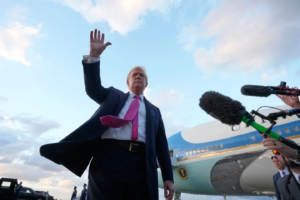In a bold escalation of the current battle between the White House and Democratic states, Illinois filed a federal lawsuit to prevent President Donald Trump from deploying hundreds of federalized National Guard soldiers into Chicago’s streets.
The court challenge, filed Monday by the State of Illinois and the City of Chicago together, comes just hours after a federal judge in Oregon issued a temporary restraining order halting a similar deployment in Portland. The suit is a strong statement against what state officials characterize as an unlawful federal overreach.
The Core of the Dispute
At the heart of the lawsuit is a weekend order by the Trump administration to “federalize” up to 300 members of the Illinois National Guard, as well as another 400 from Texas, for duty in Chicago. The action was made despite the objections of Democratic Gov. J.B. Pritzker of Illinois.

The administration’s announced reason for the deployment is the protection of an Immigration and Customs Enforcement (ICE) center in a Chicago suburb, where protests of Trump immigration policy have occurred. The explanation is dismissed by the lawsuit as a “flimsy pretext,” asserting that the actual motivation is an extension of what the complaint describes as President Trump’s long-anticipated “War” on Chicago and Illinois.
Legal Arguments Against the Deployment
The state’s complaint in law has a multi-faceted argument regarding illegality of deployment:
Violative of the Posse Comitatus Act: This basic federal law strictly forbids the application of the U.S. military to act for domestic law enforcement objectives. According to Illinois, deploying federally-funded National Guard troops to conduct policing functions within Chicago is unequivocally violative of this law.
Infringement of States’ Rights (10th Amendment): The action alleges that the federal government is overreaching Governor Pritzker’s constitutional authority as commander-in-chief of the Illinois National Guard. By federalizing the troops without the governor’s consent for a domestic deployment, the administration is infringing the state’s sovereignty and jurisdiction over local law enforcement issues.
Failure to Meet Legal Requirements: The state maintains that the Trump administration is unable to meet the legal requirements to federalize the National Guard for this reason without the governor’s approval, especially when the state itself has not asked for federal assistance to law enforcement.
A Pattern of Military Deployment Expansion
This move is considered the newest example of the Trump administration’s increasing reliance on military power in its second term. Others include deploying troops to the U.S.-Mexico border and a controversial order directing troops to shoot suspected drug traffickers off the coast of Venezuela without due process.
While National Guard troops are otherwise under the command of their state governors, they can be federalized for specific purposes. Federal officers and Guard soldiers have already been deployed by the Trump administration to other cities like Washington, D.C., and Los Angeles and has vowed to deploy them to other Democrat-controlled cities like Portland and Chicago despite local demonstrations.
The existing legal landscape is unsettled. Although the Oregon ruling is a temporary win for protesters opposed to deployments, another federal judge in California issued an injunction recently to bar the deployment of federal troops there to combat crime, although that ruling is currently on hold as it is being appealed by the administration.
The White House has yet to issue a public comment regarding the Illinois suit. The suit sets the stage for an historic constitutional battle over the limits of federal authority and the use of the military in US cities.




